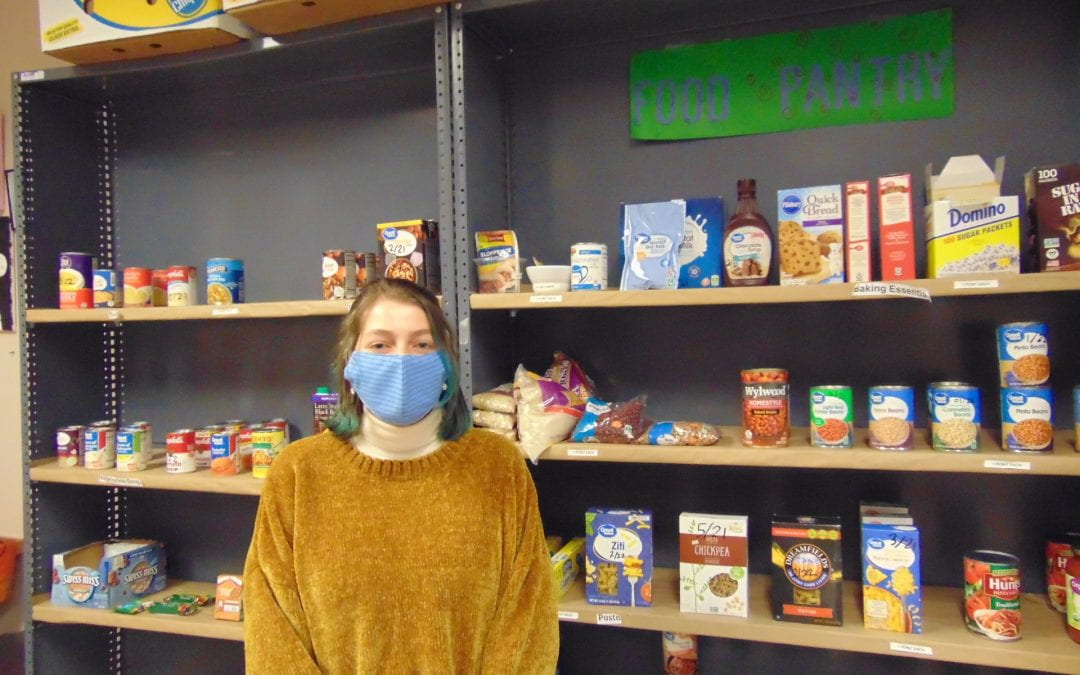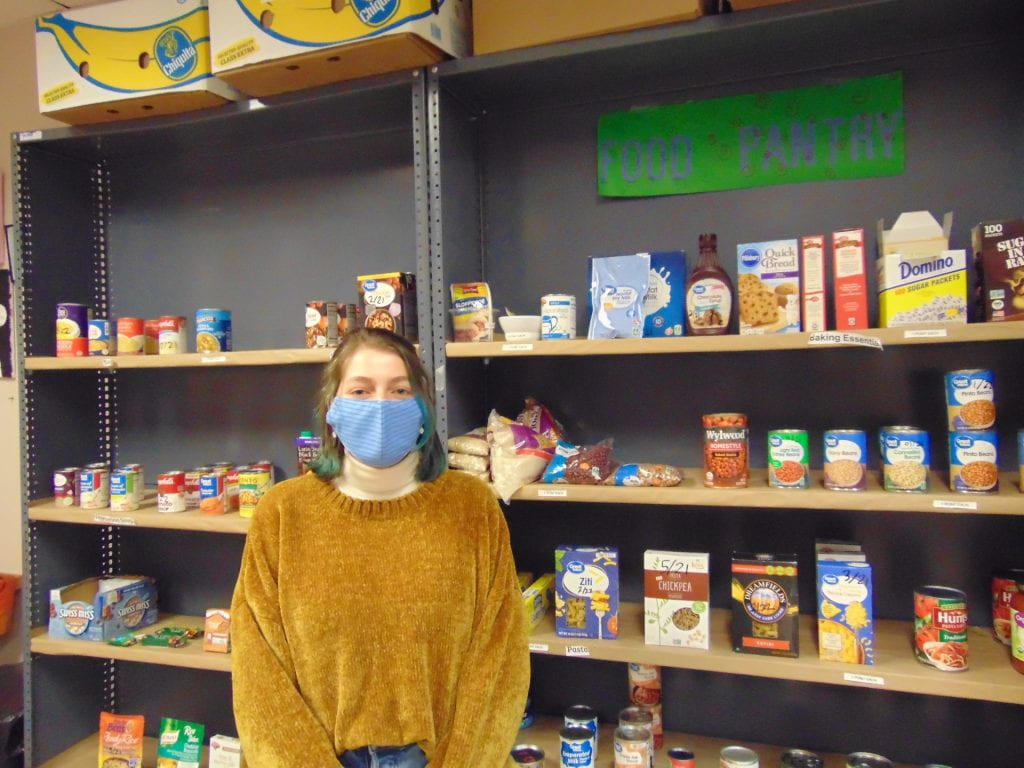
Nov 12, 2020 | Uncategorized |
By Madison Archer, Contributing Writer

Twilight Smart-Benson, one of the Thrifty Beaver’s student workers. (Photo courtesy of Sam Shirley)
In the basement of the Fusion Center there is a room filled with donated supplies. Clothes, food, kitchen supplies, school supplies, textbooks and personal hygiene items. The Thrifty Beaver (TB) is a student-run food pantry and clothing exchange, aimed at helping UMF students “not fall through the cracks” said Mark Pires, Interim Sustainability Coordinator.
The Thrifty Beaver (TB) has made some compromises in how it is run to ensure safety is possible for students. Reduced hours and limited stock have proven to be struggles for the Thrifty Beaver.
Although new to campus, Pires has been hard at work along with its dedicated student workers trying to help the “Thrifty” get ready for students to utilize during the pandemic. Pires and the student workers have had to put away some items, like kitchenware, due to concerns of touching and passing items around. They also shut down the fitting room where students could try on the clothes that have been donated.
There is only one person allowed in TB at once and there is space in the hallway for students to wait as well. Things like prearranged hygiene bags are ready for TB customers to grab and go.
TB relies on donations from the UMF community and the Farmington community. “Typically our funds are given from the school. So we will have a once a month, big shopping trip that is school funded. That allows us to supply food to all kinds of students,” said Chelsea Roy, a sophomore environmental science and anthropology major. Roy is also involved with Sustainability Campus Coalition (SCC) which is the group that manages Thrifty Beaver.
In the past, donations have come in from current students, alumni, professors, The United Way and The University Credit Union. Alumni acknowledge the significance of the Thrifty Beaver. “Alums come in still,” said Roy. “I ran into an alum my last shift! She recognized that the Thrifty was a really vital resource and she came back to donate food.”
There are about a half dozen students employed by TB in addition to volunteering students. Pires had nothing but praise to give to the students who have been keeping the TB open. “As I become more familiar with the members of the SCC, I think that their devotion and commitment to keeping the Thrifty Beaver up and running even during COVID times is really impressive,” said Pires.
Both Pires and Roy agree that the TB is important to the campus and its students. “You know many students are on very tight budgets,” said Pires. “Here and at other campuses they might not have the resources for a full meal plan every semester. I think organizations like the SCC and TB fill an important role and need.”
Some upcoming projects that the TB is working towards includes making a commercial to feature well-known figures on campus. The other project is revamping their website to include an updated catalog of their inventory.
The Thrifty Beaver is located in the basement of the Fusion Center. They’re open Thursdays and Sundays from 4 p.m. to 7 p.m.
Sep 26, 2019 | News |
Faith Diaz, Contributing Writer
After severe, on-going problems with the Creative Writing house’s electrical system and foundations, the home-turned-writer’s-hub is scheduled to be torn down this academic year.
Thirteen days before returning for the fall semester, creative writing students at UMF were notified about the fate of their building. On Aug. 20, Jefferey Thomson, the new creative writing Department Chair, sent out a mass email stating, “As many of you know (after sitting through many false-alarm fire-alarms) there have been some pretty serious problems with the house’s electrical systems. In addition, there are some serious issues with the house’s foundation.”
The email continued, reading, “What this adds up to, sadly, is that the cost of fixing the house has become prohibitive for the University and it needs to be torn down. As a result, by the time you get here, the creative writing program will have been moved to new offices in the bottom of the Fusion Center.”
When students arrived to campus they saw that the building still stood but no one was permitted to enter.
Thomson elaborated on how this decision came to be made and what it means for the creative writing students. “In June, the acting Provost, Kathy Yardley, emailed me and said she wanted to walk us around some spaces for the creative writing program. This was the first we [as faculty] heard about it specifically,” he said.
The board that was assembled for the first notification of the closure consisted of faculty members Linda Britt, Eric Brown (interim President of UMF at the time), Jefferey Thomson, and Kathy Yardley. Britt, the humanities chair, was unavailable to comment due to traveling.
Thomson said, “We, as in the creative writing faculty, we didn’t know that the house was in that bad of shape until that moment. And then because of the transition to the new president and people moving around in upper administration, we weren’t told officially we were moving until the 15th of August or something like that.”
He continued, “The reasons that students were surprised about it is because it happened rather quickly.”
Over the summer, UMF went through a presidential shift from Eric Brown to Edward Serna. This administrative shift stalled many projects, including the placement of creative writing majors, which meant that the official changing of locations happened within the official notification of the creative writing faculty, students and the start of the first day of classes this fall.
Upon students returning to campus, the creative writing faculty is aware of the general displeasure of students for the loss of the house. “There’s hope that the basement down here [in the Fusion Center] is going to be a temporary position for us,” Thomson said. “That within the next year or so, we will be able to move into an equivalent space.”
Thomson came to UMF in 2003 as an assistant professor and after four years, he received tenure. After six years of teaching as an associate professor, in 2013, he solidified his position and joined the full-time staff. Due to Patricia O’Donnell’s retirement, Thomson has become the Department Chair of the creative writing program.
He concluded his thoughts on the program’s location change with, “I’ve asked to be included in that discussion [of the future locale of creative writing courses] because, yes, writing is so solitary that it helps to have a space where you can have a sense of this, this place that is yours to share with your peers. And we are trying to make [the Fusion Center] like that but we understand that it is not the same.”

